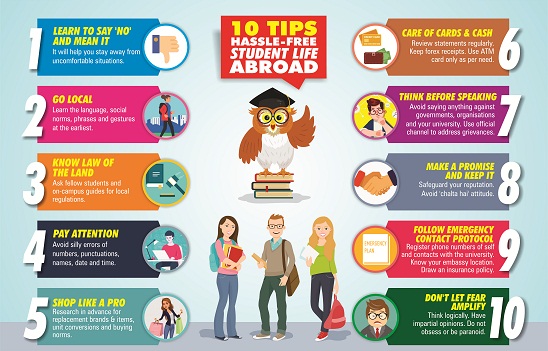10 Tips for a Hassle-Free Student Life Abroad

The day for you to pack your bags and leave for college is coming closer. Your mind is buzzing with excitement and a million questions. Everyone you meet has advice for you. “Take care of your luggage and documents”. “Don’t neglect your health”. “Don’t waste time or money”. You have probably memorised these suggestions by now. They will definitely keep you out of trouble.
But the real trouble is what strikes you when you least expect it. It often traps you from the quarters you thought were safe. We have compiled a unique list of solutions that will help you avoid unwarranted risks. Follow these and you will have a safe stay.
1. Learn to say ‘No’
You are a new student in a new country. You may feel a bit unsure about how to respond to other people. If something bothers you deeply then a polite ‘no’ is the password to get out of unwanted situations. You don’t have to do anything that makes you uncomfortable just to fit in. May it be term seniors, shopkeepers or someone who is pestering you, say ‘no’ and mean it.
2.Understand social norms
Try and learn the local language at the earliest. Different phrases, gestures and words mean different things in different countries. What may seem innocent to you may offend others. A naïve ‘thumbs up’ sign may be misunderstood gravely in some countries. Understand the concept of personal space and common terms of endearment. Saying ‘my love’ is the UK is as common as saying ‘bhai’ in India.
3.Know local laws
Knowing country-specific laws will save you from getting into a messy situation with the authorities. Running out of petrol is not a crime in India but on Autobahn in Germany, it can attract a fine. It is the same with feeding pigeons in St. Mark’s Square in Venice, photographing a policeman in France or chewing gum in Singapore. Mistakes, like stepping on local currency or loitering around embassies and military areas, may draw a jail term in many countries. It is also a good idea to know the list of contraband items before you fly.
4.Pay attention
Many destinations have similar sounding names. Make an effort to know the difference. You don’t want to hop onto a bus in the opposite direction when you are already running late. You must scan your hostel’s safety evacuation map and know the exit stairways. Do read the fine print of your credit card privileges. Some airlines and hospitality services provide charge waivers on them.
Be careful with numbers, names, punctuations, date and time. A silly error can leave you stranded with a missed flight, no money and no accommodation in peak season.
5.Brands, grocery & household items
Your first trip to the supermarket can be disorienting. The brands that you have grown up with may not be around. The food items you took for granted may be difficult or impossible to find. Do your research beforehand for replacement brands and groceries. Pound to kilogram, Fahrenheit to Celsius and kilojoules to calories are some conversions that you will have to keep in mind apart from the currency calculations. Read up about them. You will turn you into a fast and efficient shopper in no time.
6.Cards & cash
Some countries do not support 6 digit pin numbers for debit/credit cards. Take measures to avoid getting stuck in such a situation. Review your online card statements to keep a check on fraudulent transactions or overdrafts. Keep the receipts of your foreign exchange. You may have to present them as proof at some airports. Use ATMs as and when you require them. They offer one of the best exchange rates.
Read more: Things To Remember When Withdrawing From An ATM Abroad With Local Bank
You don’t have to worry about transaction fees as Thomas Cook’s Study Buddy student offer provides ATM withdrawal and remittance services for free.
7.Watch what you say in public
You are representing your country at a social as well as an ideological level. You will be harming yourself and future students if you indulge in acts of dishonour and country bashing. Do not make damaging remarks with respect to the university or governments. If you have any grievances, address them through official channels.
8.Make less promises
Make no promises if you have no intention of keeping them. ‘I will call you tomorrow’ is a simple statement. So is ‘you are most welcome to stay with me when you visit my country’. It will not be possible for you to keep your word every time. Think before you commit. Otherwise you will end up with a negative reputation and unnecessary heartache.
Read more: Traveling hacks you need for your next overseas trip.
9.Emergency contacts
Be in touch with relatives or friends living nearby. Register their name in the university’s emergency contact protocol. Meet your on-campus and off-campus counsellors often and keep their phone numbers handy. If you are undertaking adventure sports or other high-octane activities, make sure you have the consent of your parents.
It is a good idea to physically go and see your country’s embassy location once. Know how to reach there via public transport. Find out the local contact or email ids of people to approach at your Insurance Company. If you haven’t yet found a reliable insurance partner then read more about these safeguards at Thomas Cook Student Travel Insurance page. Thomas Cook Insurance provides a cashless security cover to a multitude of losses.
10. Don’t let fear overpower you
One anxiety leads to the other. A small issue can snowball into a big problem if you keep thinking about it. There is a very fine line between being careful and having an obsessive fear of everything around you. Think logically and learn to compartmentalise matters. All will be well if you keep these effective tips in mind.
